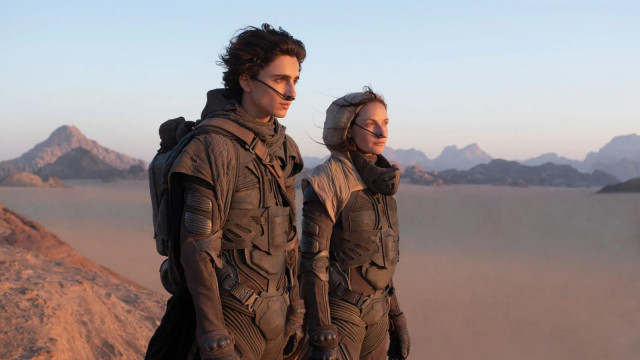Our stories are good enough, but our people are not: MENA critics slam lack of diversity in Dune 2
The sci-fi adaptation has been criticised for under-utilising MENA actors erasing culture

Despite receiving accolades for stunning cinematography and visual effects, Dune: Part 2, director Denis Villeneuve’s sequel to Dune: Part One, has come under fire by critics for its lack of diversity and stereotypical depiction of Middle Eastern culture, reported Variety.
The Dune films, based on Frank Herbert’s 1965 sci-fi classic about false idols, imperialism and religion, take place on a distant planet, Arrakis, home to the Freman. In the sequel, starring Timothée Chalamet, Rebecca Ferguson and Zendaya, Villeneuve explores Arrakis at a deeper level. With the original novel heavily rooted in Middle Eastern and North African (MENA) and Islamic culture, the film has been called out for misrepresenting its source culture.
Stark lack of MENA talent
“From the use of beads and prostration in prayers by the Fremen, to the almost-Arabic language, phrases pulled from religious texts and the wearing of veils, it felt like Dune takes a heavy amount of inspiration from Islam, Middle Eastern and North African cultures yet simultaneously erases us from screen,” wrote Furvah Shah, a Muslim journalist, in a piece for Cosmopolitan UK as she expressed her frustration with the lack of onscreen MENA talent in major roles in the film.
In a similar vein, Variety reported that Amani Al-Khatahtbeh, founder of MuslimGirl.com, pointed out the lack of representation of MENA actors across Hollywood in general.
“One of the big things we hear when it comes to Middle Eastern people getting cast or brown people getting cast is there is not enough talent, yet there is no hesitation and no challenge for the industry to cast those actors from those backgrounds in the stereotypical roles of being terrorists or the villains. Conveniently, we are at a surplus of Middle Eastern actors when it comes to negative portrayal,” she noted.
Serena Rasoul, a casting director and founder of MA Casting, echoed similar sentiments and told Variety, “This was a missed opportunity to honour the region’s rich culture and heritage. Our stories are good enough, but our people are not.”
Conforming to tropes and simplifying culture
Whilst the film utilises Middle Eastern and North African imagery, the lack of diversity in the cast has also been picked up on by other critics. With Souheila Yacoub, a Swiss-born actor of Tunisian heritage being the only minority actor relegated to playing the role of the “noble savage” or "native fixer" - whose main role in the trope is to help the hero and die - the stereotypical depiction left a sour impression on Thomas Simsarian Dolan, an academic advisor for the MENA Arts Advocacy Coalition and faculty in Middle Eastern and South Asian Studies at Emory.
“The native fixer is in on the action, but definitely in a decidedly second-class position, subservient to the colonial power or hero,” explained Dolan. “If the novel is so undeniably anchored in this place, why is it so unpalatable to employ MENA performers and creatives?”
In addition to failing to utilise more MENA performers, Variety reported that Dune: Part Two has also been criticised for altering elements of language from its source novel, thereby drawing from marginalised cultures and people without centering them and ultimately weakening novelist Herbert’s anti-colonial message. In a recent New Yorker piece, Manvir Singh, an assistant professor of anthropology at the University of California, Davis, points out how Herbert’s novel was filled with Arabic, yet the films’ linguist David J. Peterson removed it for “believability.”
Plea to Hollywood
Critics called on Hollywood to take a bigger responsibility to faithfully portray minority cultures, especially in the light of ongoing global devastation in Middle Eastern and North African territories. “The way we’re portrayed in the media has a direct impact on the way people perceive our communities that are already facing unspeakable oppression and complacency,” maintained Al-Khatahtbeh.
Whilst director Villeneuve declined to speak to Variety, he has previously defended his Dune: Part One adaptation and gone on record to state that his goal was to be faithful to the novel. “I tried to be as faithful as possible to the images I had in my mind when I read the book when I was young,” he said. “And this idea that the world of the Fremen would be kind of inspired by culture from North Africa and the Middle East — culture that I deeply love by the way, because it’s a very complex world — there was this idea that there was something powerful that will come out from Africa in Frank Herbert’s mind. And I tried to respect his ideas. Which is why I did the casting the way I did. And I feel truly that I’m right in doing it this way. It feels authentic, it feels honest, and true to the book.”
However, as per Variety, critics have noted that in Dune: Part One, the only actor representing a minority was David Dastmalchian, who is of Iranian descent, and played the role of a House Harkonnen, which colonised Arrakis and exploited its resources.
With minority actors still forming only a fraction of Hollywood performers and being restricted largely to conforming to stereotypes, the shift to embracing culture and inclusion in a manner that satisfies critics and viewers alike appears to still be a long way away.
Have something to add to the story? Share it in the comments.



















COMMENTS
Comments are moderated and generally will be posted if they are on-topic and not abusive.
For more information, please see our Comments FAQ